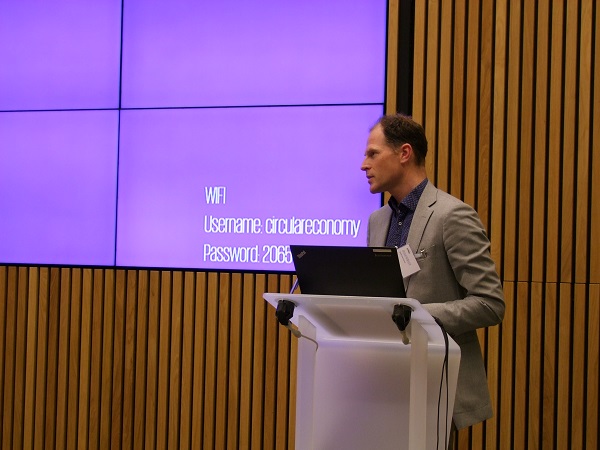
On Thursday after work, KPMG Luxembourg hosted an event addressing the Circular Economy at their headquarters in Luxembourg-Kirchberg, in collaboration with Phillips, to a 50-strong audience.
Patrick Wies, Partner of Public Sector & National Markets at KPMG Luxembourg, moderated the event, the third annual such event the organisation has hosted, and introduced the speakers for the seminar which touched on some small aspects of the circular economy.
Markus Laubsxher, Director of Sustainability at Philips, talked about the Circular Economy in Health Care services. He talked about working together with the World Economic Forum in Geneva as well as McKinsey and others.
He explained that 70% of Philips' business is B2B with an emphasis on healthcare. Royal Philips operates in the HealthTech domain, where they see a €140 billion opportunity, with Philips Lighting at €65 billion. He stressed that what they do is to innovate across the health continuum, taking light beyond simple illumination, with the digital economy helping to drive it - LED lighting is driven by technology.
To achieve a healthier and more sustainable world, they adopt meaningful innovation, with a link to the circular economy by adding value to each step of the process. However, much value is lost when looping everythign together, and this is where the circular economy is addressed when these losses can be reduced, particularly in the service offerings.
In performance-based healthcare, long-term partnerships offer shared accountability, enabling co-creation of solutions that enable integrated people-centric healthcare delivery that improves care and lowers costs.
He talked about re-thinking problems, resulting in redesigning what they do, where they do it and how they do it. The result is tailored solutions from a catalogue of service options. Value optimisation, for example, is replacing the act of disposal of obsolete equipment, through upgrading or reuse of the equipment and components through refurbishment. Recycling of end-of-life equipment is being replaced by cascading of such equipment in secondary markets. Also, the issue of under-utilisation is addressed by sharing between operators.
Anton Brummelhuis, Senior Director at Philips Lighting, talked about their branded solution Circular Lighting. He expects to see a 70% increase of lighting by 2050, partly due to population growth (7 billion to circa 9 billion) as well as more energy-efficient light becoming available (lighting currently accounts for 19% of energy costs). As a result of digital light becoming more popular, this enables circular business models such as "Circular Lighting". Each light point can become a sensor which can then create an intelligent newtork, e.g. to adapt air conditioning.
The point of of a circular economy is how to preserve value: if the hardware is still in working order, then it can be preserved, possibly by a component replacement or a software upgrade.
Arnaud Walrecht, Senior Manager KPMG Netherlands, talked on the social aspect of circular product or service - the Mitsubishi Elevator True Value Case. He showed a video of societal impact of circular solutions, by way of a case study on the Volvo Group which studied the environmental and societal impacts of electric buses, proving more value for society and shareholders.
He talked about societal challenges and financial value. A few years ago KPMG produced a report on 10 mega trends, from which they came up with the True Value methodology, which he went into some detail, and the role of externalities.
He talked about unlocking additional value in construction and presented a case study on Mitsubishi by measuring Total Cost of Ownership as well as usage of elevators, where the incident cost of failure showed that Mitsubishi provided best value in societal impact over its competitors.
Photos by Geoff Thompson








